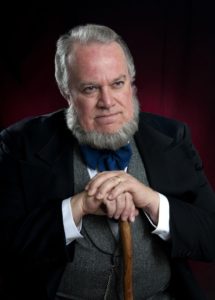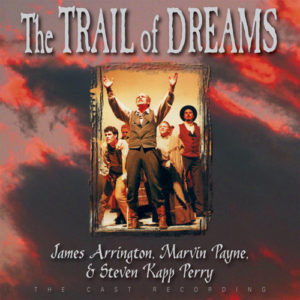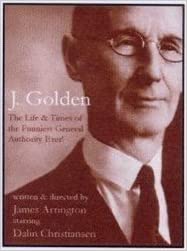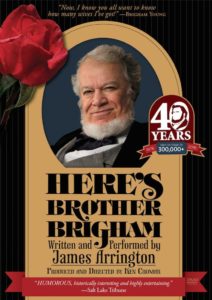 James Arrington has been presented with the The Smith-Pettit Foundation Award for Outstanding Contribution to Mormon Letters. A panel honoring him, featuring Mahonri Stewart, Elizabeth Hansen, Marvin Payne, Terry Petrie, and Steven Kapp Perry, was held online on May 1, and is available on Youtube. Here is the award citation, written by Mahonri Stewart, as well as a biographical sketch of Arrington’s career.
James Arrington has been presented with the The Smith-Pettit Foundation Award for Outstanding Contribution to Mormon Letters. A panel honoring him, featuring Mahonri Stewart, Elizabeth Hansen, Marvin Payne, Terry Petrie, and Steven Kapp Perry, was held online on May 1, and is available on Youtube. Here is the award citation, written by Mahonri Stewart, as well as a biographical sketch of Arrington’s career.
Award Citation
 Not unlike Hal Holbrook, famous for his one-man performance of Mark Twain, James Arrington built his career on solo performances that have reached thousands in the Intermountain West and in countries as far flung as England and New Zealand. Examples of his one-person plays include Here’s Brother Brigham, J. Golden, Tumuaki! Matthew Cowley of the Pacific, Wilford Woodruff: God’s Fisherman (co-written with Tim Slover), and The Farley Family Reunion (and its riotously funny sequels The Farley Family Reunion 2: The Next Gyration and The Farley Family X-Mas). Yet, his accomplishments range even beyond his considerable accomplishments as a playwright and an American Conservatory Theatre trained theatre performer. Arrington has also been a screen actor (A More Perfect Union); a voice-over actor for animation (The Swan Princess, Living Scriptures); a stage director; a producer; and an educator at Utah Valley University, where he cultivated a generation of award-winning playwrights and actors. Like his manic performance of his unruly and hilarious Farley Family, Arrington is a man who has shifted between many roles to adapt to the challenges confronted by that rare artist who made a living off his creative work. His rubber face and quick wit are legendary to the thousands who have flocked to his performances across the world.
Not unlike Hal Holbrook, famous for his one-man performance of Mark Twain, James Arrington built his career on solo performances that have reached thousands in the Intermountain West and in countries as far flung as England and New Zealand. Examples of his one-person plays include Here’s Brother Brigham, J. Golden, Tumuaki! Matthew Cowley of the Pacific, Wilford Woodruff: God’s Fisherman (co-written with Tim Slover), and The Farley Family Reunion (and its riotously funny sequels The Farley Family Reunion 2: The Next Gyration and The Farley Family X-Mas). Yet, his accomplishments range even beyond his considerable accomplishments as a playwright and an American Conservatory Theatre trained theatre performer. Arrington has also been a screen actor (A More Perfect Union); a voice-over actor for animation (The Swan Princess, Living Scriptures); a stage director; a producer; and an educator at Utah Valley University, where he cultivated a generation of award-winning playwrights and actors. Like his manic performance of his unruly and hilarious Farley Family, Arrington is a man who has shifted between many roles to adapt to the challenges confronted by that rare artist who made a living off his creative work. His rubber face and quick wit are legendary to the thousands who have flocked to his performances across the world.
 Arrington has performed as a prophet for prophets and other leaders of the Latter-day Saint faith tradition, including Gordon B. Hinckley and Spencer W. Kimball. Yet, Arrington has never lost that folksy touch and fervent love for the common man/woman of Mormonism. With his pen and his tongue, he has portrayed a range of Mormons—from the heights of the legendary Brigham Young, to the salt of the earth, casserole bearing Aunt Pearl—all while focusing on the value, heart, and humor of them all. Arrington brings a mirror to Mormon society—at times a fun-house mirror that purposely exaggerates and distorts for comedic effect—but one that still authentically reflects his very keen social observations. Though some of his characters are broadly satirical, at the heart of his work is a burning faith that has weathered many challenges and personal disruptions to form a mature and seasoned worldview.
Arrington has performed as a prophet for prophets and other leaders of the Latter-day Saint faith tradition, including Gordon B. Hinckley and Spencer W. Kimball. Yet, Arrington has never lost that folksy touch and fervent love for the common man/woman of Mormonism. With his pen and his tongue, he has portrayed a range of Mormons—from the heights of the legendary Brigham Young, to the salt of the earth, casserole bearing Aunt Pearl—all while focusing on the value, heart, and humor of them all. Arrington brings a mirror to Mormon society—at times a fun-house mirror that purposely exaggerates and distorts for comedic effect—but one that still authentically reflects his very keen social observations. Though some of his characters are broadly satirical, at the heart of his work is a burning faith that has weathered many challenges and personal disruptions to form a mature and seasoned worldview.
 It is no accident that Arrington’s plays often center around Mormon historical characters, being the son of famed LDS Church Historian Leonard Arrington. Inheriting his father’s passion for Mormon history, deep research went into his characterizations of Brigham Young, J. Golden Kimball, Matthew Cowley, and Wilford Woodruff. In addition to those one-man plays, he also wrote full cast plays about Joseph Smith (The Prophet), The Utah War (March of the Salt Soldiers, co-written with Mahonri Stewart), and the Mormon pioneer exodus (Trail of Dreams, with Marvin Payne and Steven Kapp Perry). Deeply steeped in legitimate historical sources as they are, his plays are not only good art, but good history.
It is no accident that Arrington’s plays often center around Mormon historical characters, being the son of famed LDS Church Historian Leonard Arrington. Inheriting his father’s passion for Mormon history, deep research went into his characterizations of Brigham Young, J. Golden Kimball, Matthew Cowley, and Wilford Woodruff. In addition to those one-man plays, he also wrote full cast plays about Joseph Smith (The Prophet), The Utah War (March of the Salt Soldiers, co-written with Mahonri Stewart), and the Mormon pioneer exodus (Trail of Dreams, with Marvin Payne and Steven Kapp Perry). Deeply steeped in legitimate historical sources as they are, his plays are not only good art, but good history.
For his plays, for his performances, for his keen wit, for his warm insight, for his educator’s cultivation of a new generation of Mormon writers, and for his lasting contribution to Mormon Drama, the Association for Mormon Letters honors James Arrington with the Smith-Pettit Foundation Award for Outstanding Contribution to Mormon Letters.
Biographical sketch
 James Arrington was schooled professionally at The American Conservatory Theatre in San Francisco and earned a Masters Degree in Theatre from Brigham Young University. He has worked professionally for 40 years and became a sensation on the Utah theatre scene when he created and stared in his groundbreaking one-man show Here’s Brother Brigham (1976). By 2001 he had performed the play over 700 times (including a performance at the first Association for Mormon Letters conference in 1976). He followed this by displaying a quirky writing talent in The Farley Family Reunion (1980) and J. Golden (1982). He starred in the former and wrote, directed and produced the latter.
James Arrington was schooled professionally at The American Conservatory Theatre in San Francisco and earned a Masters Degree in Theatre from Brigham Young University. He has worked professionally for 40 years and became a sensation on the Utah theatre scene when he created and stared in his groundbreaking one-man show Here’s Brother Brigham (1976). By 2001 he had performed the play over 700 times (including a performance at the first Association for Mormon Letters conference in 1976). He followed this by displaying a quirky writing talent in The Farley Family Reunion (1980) and J. Golden (1982). He starred in the former and wrote, directed and produced the latter.
 He went on to write and produce numerous one-man Church history plays as Wilford Woodruff: God’s Fisherman (with Tim Slover, 1987) and Tumuaki! Matthew Cowley of the Pacific (1997), and the Farley Family Reunion sequels Farley Two: the Next Gyration (1990) and Farley Family Xmas (1993). Arrington also contributed to the pioneer musical The Trail of Dreams (1997) with Marvin Payne and Steven Kapp Perry.
He went on to write and produce numerous one-man Church history plays as Wilford Woodruff: God’s Fisherman (with Tim Slover, 1987) and Tumuaki! Matthew Cowley of the Pacific (1997), and the Farley Family Reunion sequels Farley Two: the Next Gyration (1990) and Farley Family Xmas (1993). Arrington also contributed to the pioneer musical The Trail of Dreams (1997) with Marvin Payne and Steven Kapp Perry.
He has written and produced numerous smaller works and was granted a commission by the Sesquicentennial Utah War Committee to co-write (with Mahonri Stewart) a new touring work entitled March of the Salt Soldiers: The Utah War (2008). He has written for stage, screen, outdoor pageant, radio drama, and puppet shows. He is the author of Aunt Pearl’s Family Reunion Book. He has frequently appeared on the stage and as a voice actor. For example, he voiced the character Frodo Baggins in the 1979 radio dramatization of The Lord of the Rings by The Mind’s Eye radio company.
 Arrington taught as an associate professor at Utah Valley University, and in 2000 was the first Chairman of the Department of Theatrical Arts for Stage and Screen. He has served in that position three times. He received both the local Star award from the SCERA and a highly sought after regional award, The Kennedy Center American Theatre College Faculty Excellence Award. Along with his teaching at UVU, Professor Arrington oversaw the playwriting programs. He also originated the annual Short Attention Span Theatre, an engaging ten-minute play festival devoted to new student works.
Arrington taught as an associate professor at Utah Valley University, and in 2000 was the first Chairman of the Department of Theatrical Arts for Stage and Screen. He has served in that position three times. He received both the local Star award from the SCERA and a highly sought after regional award, The Kennedy Center American Theatre College Faculty Excellence Award. Along with his teaching at UVU, Professor Arrington oversaw the playwriting programs. He also originated the annual Short Attention Span Theatre, an engaging ten-minute play festival devoted to new student works.
Arrington retired from UVU in 2016, after which he and his wife Colleen served an LDS Church mission to Nashville, Tennessee. James and Colleen live in Saratoga Springs, Utah.
Bibliography of plays
Another Jasmine, ten-minute play, 2013 (unproduced)
Queens of Birdland, (co-written with Carl Arrington), 2012
Been There/Done That, ten-minute play, 2009 (unproduced)
March of the Salt Soldiers, (co-written with Mahonri Stewart), 2008
Identity Crisis, contemporary full-length play, 2005 (unproduced)
Ode to Mr. Bean, ten-minute play, 2003 (unproduced)
Streetwise, ten-minute play, 2003
Hope As A Leak, a ten-minute play, 2002
YOUtahneeks – The Language Of Ancient Sagonapmit, a one-act play, 2001
Tumuaki! Matthew Cowley of the Pacific, one-man show, 1997
The Trail of Dreams,(Co-written with Marvin Payne and Steven Kapp Perry) historical musical, 1997
The Farley Family Xmas, one-man comedy, 1995
The Prophet, historical drama, 1994
Farley Family 2: The Next Gyration, 2 actor comedy, 1990
Simple Sally’s Subtle Secret, four-act melodrama, 1989
Wilford Woodruff: God’s Fisherman, (co-written with Tim Slover) one-man biographical drama, 1987
Independence, outdoor dramatic pageant, 1985
Santa’s Workshop, Young audience, puppet and stage show, 1984
The You Who Safety Crew, Young audience, puppet show, 1984
The Farley Family Reunion, adapted one-man show, 1984
J. Golden, one-man biographical dramedy, 1982
The Farley Family Reunion, a two-actor show, 1980
The Razzle Dazzle Castle Revue, a vaudeville show, 1979
Here’s Brother Brigham, a one-man biographical drama, 1976
The Maker, one-act play, 1975
Midnight Redemption, one-act play, 1975
The Cold Equation, a two-actor one-act play, 1973
O Natal Mais Complicado, 2 act play in Portuguese, 1971

Well-deserved award for James Arrington. I remember early staging of “Here’s Brother Brigham” very well and was impressed with the research, the writing and the performance. I was present when he performed “Tumaki!” at a conference on the BYU Hawaii campus. An elderly Maori came down out of the stadium seating and joined in the haka as James began to stomp and gesticulate. Afterward, James told me that he had not known (though he had studied and practiced the dance carefully) that one should not execute the haka alone . It was a stirring moment. Appreciation for James Arrington’s contributions!